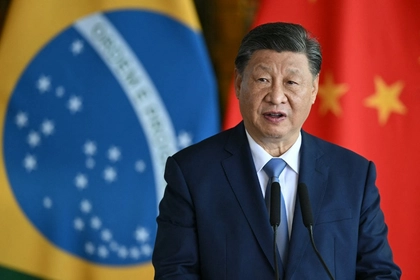The Main Directorate of Intelligence of the Ukrainian Ministry of Defense (HUR) was behind the overnight attack on two oil refineries and a metallurgical plant in Russia, sources within the special services told Kyiv Post.
During the operation, the Volgograd Oil Refinery was targeted by a drone strike, resulting in a subsequent fire.
JOIN US ON TELEGRAM
Follow our coverage of the war on the @Kyivpost_official.
Russian Telegram channel Shot reported several loud explosions near the facility around 2:30 a.m., preceded by the distinctive sound of an unmanned aerial vehicle (UAV).
Russian media alleged that Ukrainian drones were neutralized using radio-electronic warfare, causing them to crash into the oil refinery and spark the fire, which was swiftly extinguished, as confirmed by the regional governor, Andrii Bocharov. There were no casualties.
Earlier reports from Ukrainian media, citing sources, indicated that HUR's drones attacked the Volgograd oil refinery, a part of the Lukoil corporation, around 3:45 a.m. on Saturday, May 11.
It was reported that the AVT-1 and AVT-6 primary oil processing units, along with the control cable of the air coolers, were damaged at the plant, resulting in the disconnection of seven coolers. Additionally, the smoke pipe of the P-1 furnace was also damaged.
Additionally, the “Kaluganefteprodukt” oil depot in Lyudinovo and the Novolypetsk metallurgical plant were targeted during the overnight attack, with military targets being hit, according to sources within the special services.

EU Proposes Cutting 15 Russian Banks From SWIFT in New Sanctions Package
The Novolypetsk metallurgical plant has been targeted by Ukrainian drones at least twice before. One of the largest factories of its kind in Russia, it serves Russian military interests and was attacked in both February and April 2024.
According to reports, the plant produces raw materials for Russian companies involved in the production of nuclear weapons and ballistic missiles.
Late on May 10, several explosions were reported at an oil depot in the occupied city of Rovenky, in Luhansk region, with preliminary reports suggesting the use of at least one M39 ATACMS tactical ballistic missile.
In Russia's Kaluga region on May 10, UAVs targeted the Pervy Zavod plant, resulting in a fire, as reported by the region's governor, Vladyslav Shapsha.
On May 9, Kyiv Post reported that its sources within the special services revealed that the Security Service of Ukraine had carried out a successful strike on the Gazprom Neftekhim Salavat refinery in the Republic of Bashkortostan.
The attack was executed using a long-range drone, which targeted the refinery's catalytic oil cracking unit. Remarkably, the Ukrainian drone's range covered an unprecedented distance of 1,500 kilometers.
Gazprom Neftekhim Salavat stands as one of Russia's largest oil refining and petrochemical production complexes, specializing in the production of gasoline, diesel fuel, and various petroleum products.
In March, officials from the Biden administration reportedly urged Ukraine to refrain from striking any oil facilities on Russian territory, fearing the potential inflationary pressure on petroleum products in the run-up to the presidential elections.
Despite these reports, Ukraine has denied any external pressure and rejected the notion of refraining from targeting Russian fuel facilities. Some Western analysts strongly support Ukraine's strategy.
You can also highlight the text and press Ctrl + Enter










